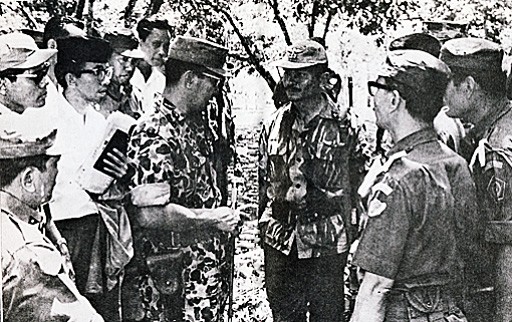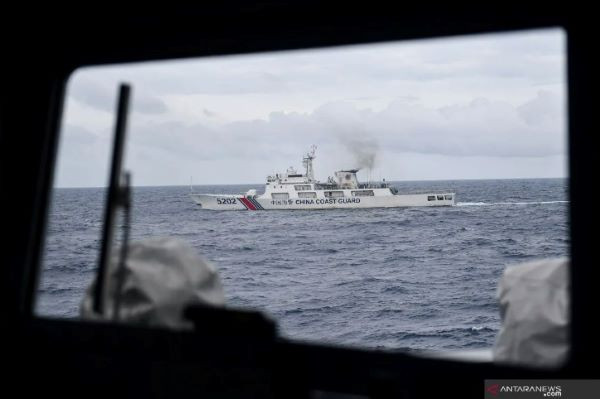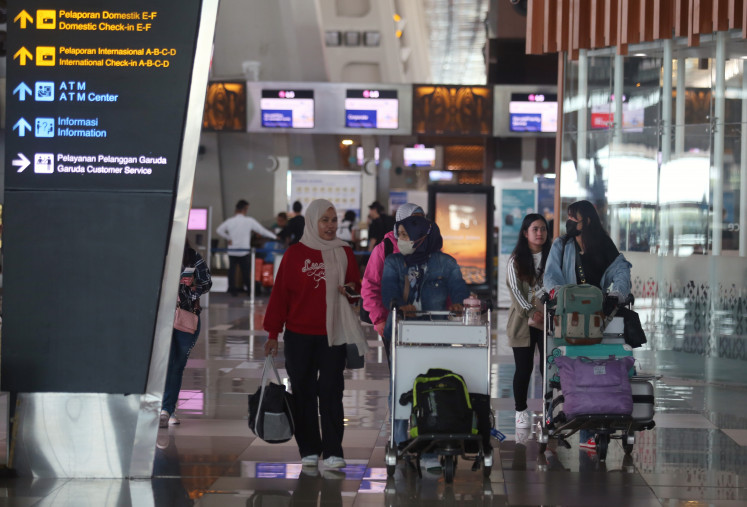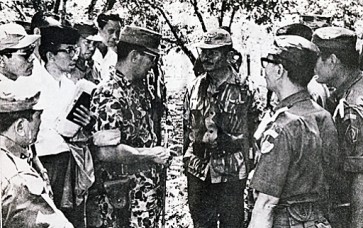Propaganda dé jà vu? Let’s learn from millennials
Change Size
 Dark history – Maj. Gen. Soeharto (center, left) briefs members of the Army’s RPKAD Special Forces (now Kopassus) prior to the removal of the bodies of Army officers who were murdered on Sept. 30, 1965. As the most senior military officer available at the time, Soeharto led all operations to restore security and impose order in the aftermath of the alleged coup attempt, which was blamed on the Indonesian Communist Party (PKI). (JP/30 Tahun Indonesia Merdeka/-)
Dark history – Maj. Gen. Soeharto (center, left) briefs members of the Army’s RPKAD Special Forces (now Kopassus) prior to the removal of the bodies of Army officers who were murdered on Sept. 30, 1965. As the most senior military officer available at the time, Soeharto led all operations to restore security and impose order in the aftermath of the alleged coup attempt, which was blamed on the Indonesian Communist Party (PKI). (JP/30 Tahun Indonesia Merdeka/-)
H
ere we go again, it’s the time of the year when the ghost of the past returns to haunt us. And this nightmare is far from over — its central scene being the murder of six generals and a captain in an attempted coup blamed on the Indonesian Communist Party (PKI) on Sept. 30, 1965.
Few know that millions were either murdered or prosecuted without trial, banished into exile or suffered discrimination for their alleged association with the PKI.
More than five decades later, people still don’t know the complete history of the 1965 tragedy. School textbooks hardly mention the communist purge. Efforts of rehabilitation, let alone attempts at reconciliation are next to nowhere, as all parties believe they are the victims.
Yet the nation is bracing for a dé jà vu moment with the public screening of the docudrama Pemberontakan G30S/PKI (The Treachery of G30S/PKI). Just like textbooks, the film, which only centers on the officers’ killings, is controversial for its version of history and manipulative content. Historians see the film as propaganda to create trauma and stigmatize communism devised by Soeharto to justify his regime after claims of foiling the coup. Thus the film was broadcast with no censorship during prime time every Sept. 30 under the New Order, despite its gory and bloody scenes. The government decided to stop the annual screening after Soeharto was ousted from power in 1998, citing the misleading content as the main reason.
So when Indonesian Military commander Gen. Gatot Nurmantyo ordered soldiers to watch G30S and urged public screenings of the film, so the young could learn about the history and the danger of communism, many criticized him. Human rights activists raised fears that the plan would further obstruct early attempts at survivors’ rehabilitation — as it would not only evoke trauma, but also create renewed stigma against communism. They cited children chanting “Kill PKI! Kill PKI!” during a recent public screening in Jakarta.
But would everyone give such a response? I don’t think so. Media studies have two perspectives that differentiate audience reaction to media messages. The first assumes the audience is a passive entity that can easily be brainwashed by the media, while the second theory assumes the audience is active because they can interpret messages based on their political, social and cultural backgrounds as well as their needs.
The target audience of the public screenings of G30S/PKI is today’s millennials, the generation born between the early 1980s and the late 1990s. They seem to be a more active rather than a passive audience. With access to information and the internet, they have the resources to interpret and reinterpret texts in the controversial film. So it would be naïve and overly paranoid to assume that the screening would automatically make them believe and support the military’s logic in blaming communism once they watch the movie.
















